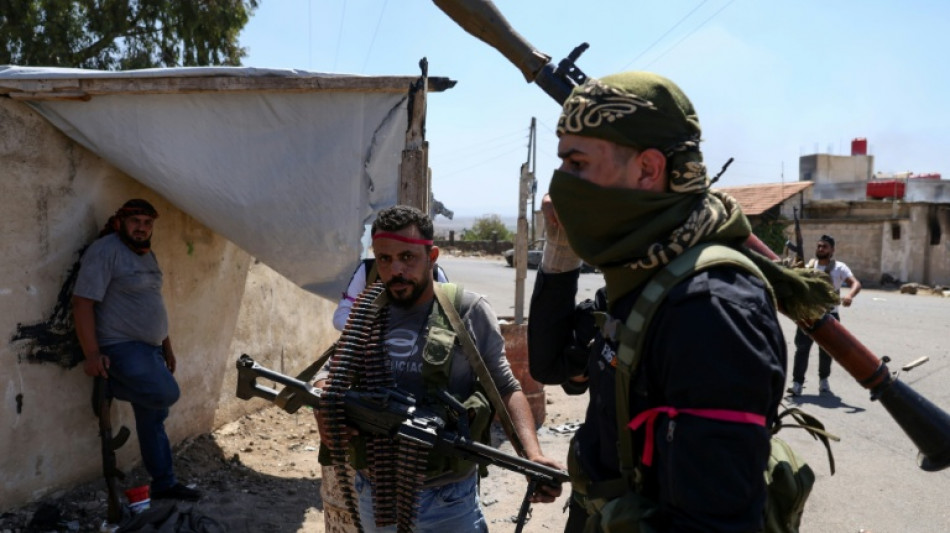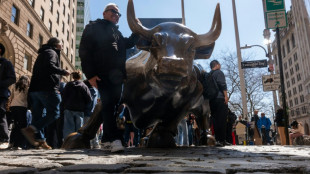

New clashes rock Syria's Druze heartland as tribal fighters reinforce Bedouin
Armed tribes supported by Syria's Islamist-led government clashed with Druze fighters in the community's Sweida heartland on Friday, a day after the army withdrew under Israeli bombardment and diplomatic pressure.
The United Nations called for an end to the "bloodshed" and demanded an "independent" investigation of the violence, which has claimed nearly 600 lives since Sunday, according to the Syrian Observatory for Human Rights.
The renewed fighting raised questions over the authority of interim President Ahmed al-Sharaa, whose interim government also has difficult relations with the Kurdish minority in the northeast and the Alawite minority on the Mediterranean coast.
It was Sharaa who ordered government forces to pull out, saying that mediation by the United States and others had helped avert a "large-scale escalation" with Israel.
Tribal reinforcements from across Syria gathered in villages around Sweida on Friday to reinforce local Bedouin, whose longstanding enmity towards the Druze erupted into violence last weekend.
Anas al-Enad, a tribal chief from the central city of Hama, said he and his men had made the journey to the village of Walgha, northwest of Sweida, because "the Bedouin called for our help and we came to support them".
An AFP correspondent saw burning homes and shops in the village, now under the control of the Bedouin and their allies.
The Britain-based Observatory said "the deployment of tribal fighters to Sweida province was facilitated by government forces, because government forces are unable to deploy to Sweida under the terms of the security agreement with Israel".
- Israel sends aid for Druze -
Israel, which bombed the Syrian army in Sweida and Damascus earlier this week to put pressure on the government to withdraw, said Friday that it was sending aid to the Druze community in Sweida.
"In light of the recent attacks targeting the Druze community in Sweida and the severe humanitarian situation in the area, Foreign Minister Gideon Saar has ordered the urgent transfer of humanitarian aid to the Druze population in the region," the foreign ministry said.
The two million shekel (nearly $600,000) package includes food parcels and medical supplies, the ministry said.
A ceasefire was supposed to take effect on Thursday, but Sharaa's office accused Druze fighters of violating it.
Sweida has been heavily damaged in the fighting and its mainly Druze inhabitants have been deprived of mains water and electricity, while communication lines have been cut.
The UN Office for the Coordination of Humanitarian Affairs said that nearly 2,000 families had been forced from their homes in Sweida province.
Rayan Maarouf, editor-in-chief of local news outlet Suwayda 24, said the humanitarian situation was "catastrophic".
"We cannot find milk for children," he told AFP.
- UN demands independent probe -
UN High Commissioner for Human Rights Volker Turk called for an end to the bloodshed, saying "the protection of all people must be the utmost priority".
He demanded "independent, prompt and transparent investigations into all violations" adding that "those responsible must be held to account".
The latest violence erupted on Sunday after the kidnapping of a Druze vegetable merchant by local Bedouin triggered tit-for-tat abductions, the Britain-based Observatory said.
The Islamist-led government sent in the army, promising to put a halt to the fighting, but witnesses and the Observatory said the troops sided with the Bedouin and committed many abuses, against Druze civilians as well as fighters.
The interim government has had strained relations with Syria's religious and ethnic minorities since it toppled longtime leader Bashar al-Assad in December.
This week's fighting marks the most serious outbreak of violence since government forces battled Druze fighters in Sweida province and around Damascus in April and May, leaving more than 100 people dead.
L.Lozano--ECdLR





